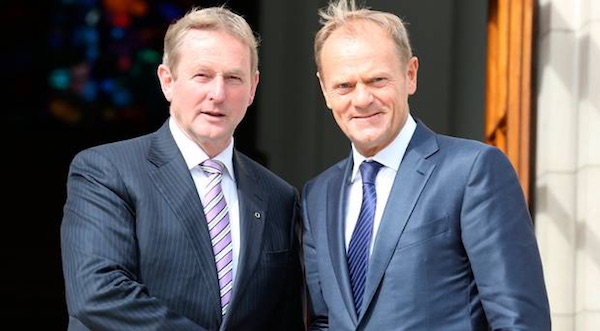
An official statement by the European Union that it will accept a future united Ireland into the EU has been cautiously welcomed by republicans as bringing international diplomatic recognition for impending Irish unification.
A special EU summit on Brexit is taking place this weekend in which the European Council will agree guidelines for Brexit negotiations. The first draft of these guidelines was strongly criticised for its inclusion of a tract of ambiguous and aspirational language in regard to Ireland, without referring to specific protections or a special status for the north of Ireland, while Spain was handed a simple veto over any development in relation to the British colony of Gibraltar.
However, there were international headlines for reports this week to confirm that European leaders have no objection to a future Irish reunification bringing the Six Counties back into the EU. In the event of reunification, the North will be treated the same manner in which East Germany became part of the EU in 1990 when it united with West Germany.
The British government has also said it has no objection to the idea, which has never actually proven controversial. However, it is being lauded as a signature diplomatic achievement of the 26 Taoiseach Enda Kenny (pictured left, with European Council President Donald Tusk) as he prepares to step down from his post next month. The statement is being referred to in the Irish media as the ‘Kenny text’.
The statement may also lead the way for a similar EU stance on Scotland, a more controversial proposition as it would boost other independence movements across Europe, such as Catalonia and the Basque Country.
Strikingly absent from these early reports, however, is any indication of progress in clearing the way for special status for the Six Counties, a move seen as key to preventing militarised and embattled border checkpoints from returning to the Irish countryside.
Special status would give the North access to the single market and customs union, with freedom of movement of goods, people and services. But so far, Dublin officials have only confirmed the draft conclusions will make reference to the “specific needs” Ireland faces in the aftermath of Brexit.
Dublin’s Minister for Public Expenditure and Reform Paschal Donohoe promised references will be made to the movement of people, the Border, the peace process and the 1998 Good Friday peace Agreement. There is also an effort underway to ensure continued EU funding for various schemes and projects which have helped to sustain the Six County economy in recent decades.
However, the 26 County administration has refused to release the details of its negotiating priorities. Instead, media briefings have sought to generate a general sense of diplomatic achievement for Enda Kenny as as a ‘soft landing’ for the departing Taoiseach.
Sinn Fein leader Gerry Adams warned the 26 County government was engaged in a spin campaign rather than a proper effort to negotiate the terms of Britain’s departure from the EU.
Mr Adams welcomed what he said appeared to be the government’s attempts to achieve amendments to the EU guidelines, although he warned “it might be too little, too late”.
“The Taoiseach has failed to set out the Government priorities in a consolidated paper, as he promised in March. He has also failed to publish what amendments, if any, he will seek to the negotiations guidelines.
“Instead, there has been a deluge of spin about what the government is doing. What it should be doing is seeking a political declaration from the European Council in its negotiation guidelines in relation to securing designated special status for the North within the EU.”
He added: “After Britain leaves the Union, we believe that no agreement between the EU and the British government should apply to the north of Ireland without agreement of both governments as co-guarantors of the Good Friday Agreement - an international treaty.”
Despite efforts by Fine Gael to promote Kenny’s ‘legacy’ as he prepares to step down as Taoiseach, Mr Adams said the Taoiseach’s input to the negotiations had fallen “far short of what is both required and expected”.
“The Taoiseach has a seat at the table. He will be in the room when decisions are taken. He has a responsibility to argue strongly for designated special status for the North within in the European Union.”
![[Irish Republican News]](https://republican-news.org/graphics/title_gifs/rn.gif)
![[Irish Republican News]](https://republican-news.org/graphics/title_gifs/harp.gif)

